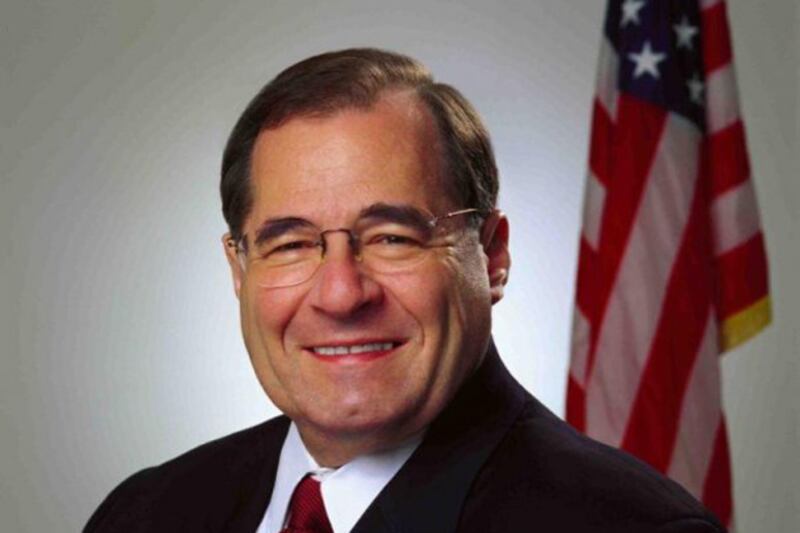When the New York Police Department evicted Occupy Wall Street from Zuccotti Park in the middle of the night on Nov. 14, using what some criticized as an over-the-top display of force, Rep. Jerry Nadler (D-N.Y.) shifted from negotiator to inquisitor. A representative of large swaths of Manhattan, he had carefully taken into account the protesters’ First Amendment rights and the complaints of nearby residents. But the police crackdown crossed the line.
“Why was press access limited, and why were some reporters’ credentials confiscated?” Nadler demanded in a statement on the eviction. “How will reported incidents of excessive force used by the police be addressed?”
On Tuesday, Nadler took his questions a step further—or a lot of steps further—when he sent a letter to Attorney General Eric Holder demanding a full investigation of the incident, including allegations that the NYPD used illegal surveillance against protesters and arrested journalists attempting to cover the eviction.
Nadler considered calling for local oversight of the alleged police misconduct, but the crackdowns on Occupy encampments suddenly spread across the country. “We heard accounts of excessive force in events around the country, and it became clear it was a national issue,” Nadler’s press secretary, Ilan Kayatsky, told The Daily Beast. “It seemed it merited a national response, and the coordination that Justice could bring. He wanted to make sure it was comprehensive in its scope.”

Nadler is linked more closely with Occupy Wall Street than any other national politician simply because the protesters’ ground zero is right in the middle of his district. (He also represents the rest of lower Manhattan, home to the financial industry the movement opposes.) But while he has transformed himself into a liaison between the protesters and their critics in the neighborhood, he’s made it abundantly clear which side he’s on.
“I expected that at some point there would be demonstrations of some sort. There has to be at some point because the situation is getting too onerous and not being represented adequately in the political system,” Nadler told Keith Olbermann in October. “What they’ve done is very important for this country. They’ve succeeded in changing the debate from austerity and how to reduce deficits to pointing out that all the benefits of the economy, of economic progress in the last 20 years, have gone to 1 percent of the population.”
Nadler is what you’d expect for a New York City congressman: reliably critical of Republican fiscal doctrine, generally opposed to foreign invasions, and steadfastly progressive on social issues. He seems to share his former colleague Anthony Weiner’s relish for calling out the GOP on the House floor—see this attack on the caucus’s “reaffirmation” of the U.S. national motto—but with a slightly less aggressive tone. The ranking member of the House judiciary subcommittee on civil liberties, he is one of the Democratic Party’s strongest voices against warrantless wiretapping and executive-power overreach.
Nadler was born in Brooklyn, but his family moved to New Jersey to try chicken farming when he was a small boy. There he got his first taste of politics.
“I started becoming politicized when I was growing up because there were two names that were never pronounced except with disdain,” Nadler told The New York Times after winning his House seat in 1992. “One was Dwight D. Eisenhower, and the other was Ezra Taft Benson, his secretary of agriculture. I didn’t know what they did, but whatever they did made it impossible for chicken farmers to produce eggs without losing money.”
The family returned to Brooklyn, where Nadler graduated from Stuyvesant High School with Dick Morris, a future Clinton strategist who ran Nadler’s campaign for student government. As an undergraduate at Columbia University, he organized students on the West Side of Manhattan against the Vietnam War and urged them to reform Democratic politics. He eventually represented the Upper West Side, where he and his family now live, in the New York State Assembly.
In his two decades in the House, Nadler has kept a close eye on local politics, and he’s by no means an enemy of the NYPD. In November, he urged the police to step up enforcement during a series of anti-Semitic acts of vandalism against Jewish residents in Brooklyn, including car burnings and vandalizing public property with swastikas. He also vocally supported the “Ground Zero mosque,” which created a national firestorm in 2010.
In October, a month after the Occupy Wall Street protests began, he attended a meeting of members of Community Board 1 in Manhattan and representatives for Occupy Wall Street to discuss neighborhood complaints. He urged the protesters to enforce the “good-neighbor policy” adopted by Occupy’s General Assembly, which included limiting drumming to two hours a day. Nadler stressed a solution that addressed residents’ complaints and protected Occupy members’ freedom of speech. Along with several other New York politicians, he sent a letter to Mayor Michael Bloomberg insisting that the city distinguish between protesters and “others who have opportunistically joined the crowd for unrelated reasons” and caused sanitation problems and criminal complaints.
But Nadler seems to think the time for negotiation has passed. “He has a very strong belief in First Amendment rights, and, like others around the country, he was somewhat alarmed at some of the images and stories and reports of police response to some of the protests,” his spokesman said. “Someone like him who’s a constitutional scholar thinks very frequently about civil-liberties issues and looks at the big picture of whether we’re holding up our constitutional responsibilities.”





